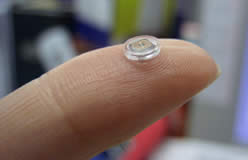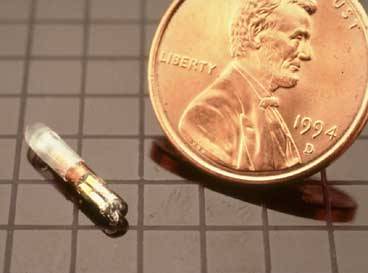Credito BIOMEDICO introdotto dalla Citibank First Bank
from: http://www.raidersnewsnetwork.com/full.php?news=482
Citibank First Bank In The World To Introduce Biometric Credit
Added: Nov 10th, 2006 7:20 AM
By Johnson Choo, Channel NewsAsia
SINGAPORE : Singaporeans will be among the first in the world to use a biometric credit card.
Citibank - the world's largest credit card issuer - has chosen to launch its biometric credit cards in Singapore.
With the biometric payment system, card users do not even need to carry their cards with them.
The biometric system is expected to revolutionalise the way people shop and make payments.
Shoppers no longer need to present their credit card and sign for payment.
Instead, it will just be a matter of having a finger scan followed by the keying in of a PIN number.
The bank is first introducing the card to some 190,000 cardholders between the age of 25 and 34.
These users, according to the bank, spend an average of S$800 a month on their credit cards.
Jonathan Larsen, CEO and Country Manager, Citibank Singapore, said, "We're launching this biometric payment solution as part of our launch of the Platinum Clear Card. And for the next couple of months, we will focus on making the biometric solution available to our Clear customers. However, very shortly thereafter, we will be broadening this to all Citibank cardholders..."
The system uses technology belonging to Pay By Touch, a global biometric authentication and payment solutions provider.
And Citibank will be the first credit card issuer in the world to use it.
Citibank says both merchants and its cardholders will not incur extra cost in using this payment service.
It plans to eventually expand the service to all of its one million Singapore customers.
Besides credit payments, users will also be able to make debit payments from their savings accounts.
Citibank plans to gradually introduce this payment system to other parts of Asia Pacific. - CNA/ms
http://www.channelnewsasia.com/stories/singaporebusinessnews/view/240445/1/.html
Citibank First Bank In The World To Introduce Biometric Credit
Added: Nov 10th, 2006 7:20 AM
By Johnson Choo, Channel NewsAsia
SINGAPORE : Singaporeans will be among the first in the world to use a biometric credit card.
Citibank - the world's largest credit card issuer - has chosen to launch its biometric credit cards in Singapore.
With the biometric payment system, card users do not even need to carry their cards with them.
The biometric system is expected to revolutionalise the way people shop and make payments.
Shoppers no longer need to present their credit card and sign for payment.
Instead, it will just be a matter of having a finger scan followed by the keying in of a PIN number.
The bank is first introducing the card to some 190,000 cardholders between the age of 25 and 34.
These users, according to the bank, spend an average of S$800 a month on their credit cards.
Jonathan Larsen, CEO and Country Manager, Citibank Singapore, said, "We're launching this biometric payment solution as part of our launch of the Platinum Clear Card. And for the next couple of months, we will focus on making the biometric solution available to our Clear customers. However, very shortly thereafter, we will be broadening this to all Citibank cardholders..."
The system uses technology belonging to Pay By Touch, a global biometric authentication and payment solutions provider.
And Citibank will be the first credit card issuer in the world to use it.
Citibank says both merchants and its cardholders will not incur extra cost in using this payment service.
It plans to eventually expand the service to all of its one million Singapore customers.
Besides credit payments, users will also be able to make debit payments from their savings accounts.
Citibank plans to gradually introduce this payment system to other parts of Asia Pacific. - CNA/ms
http://www.channelnewsasia.com/stories/singaporebusinessnews/view/240445/1/.html



